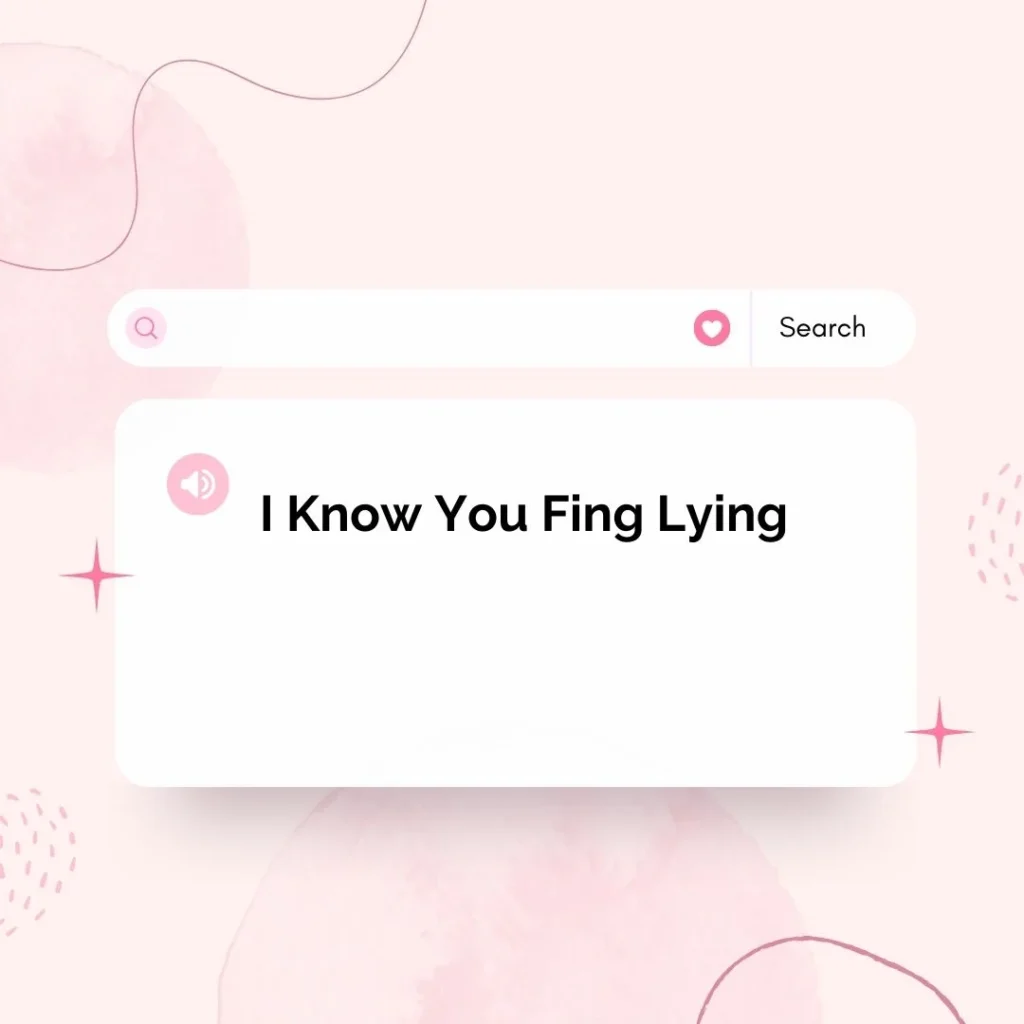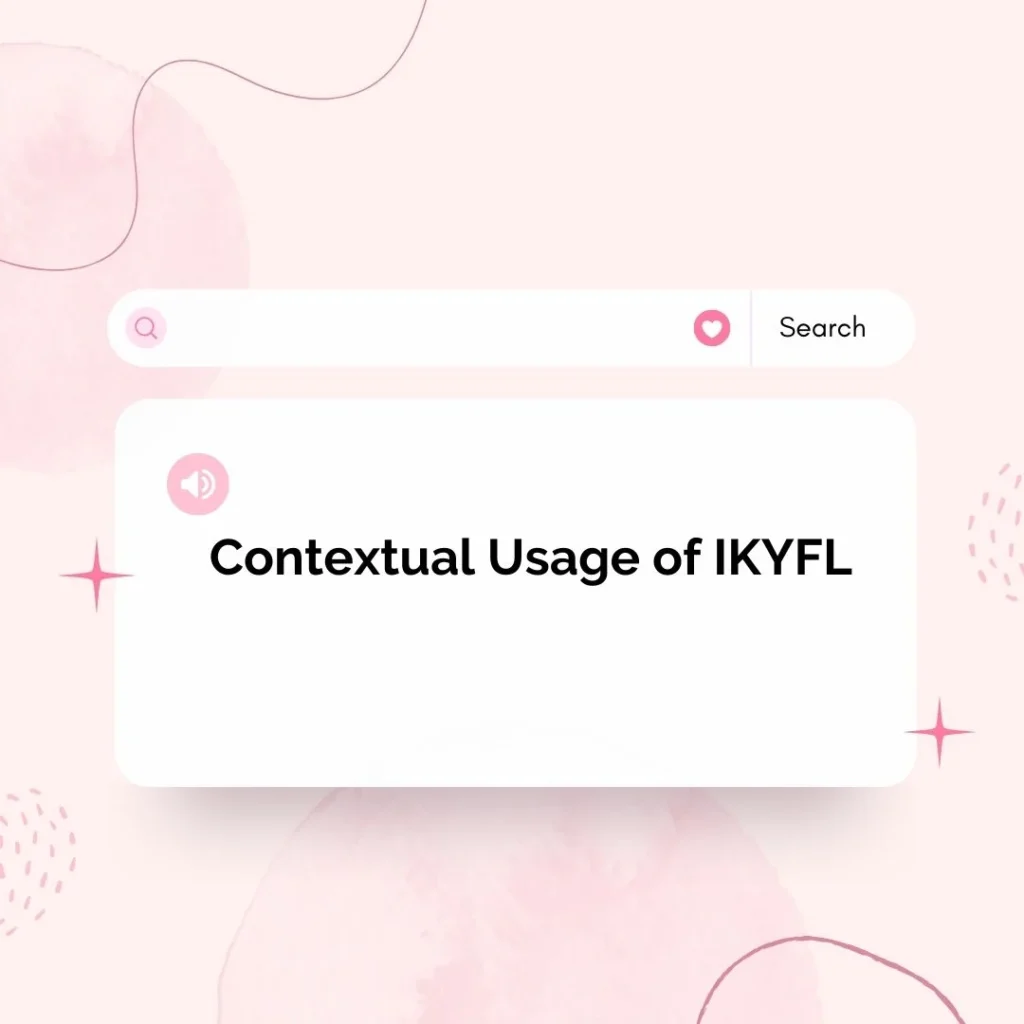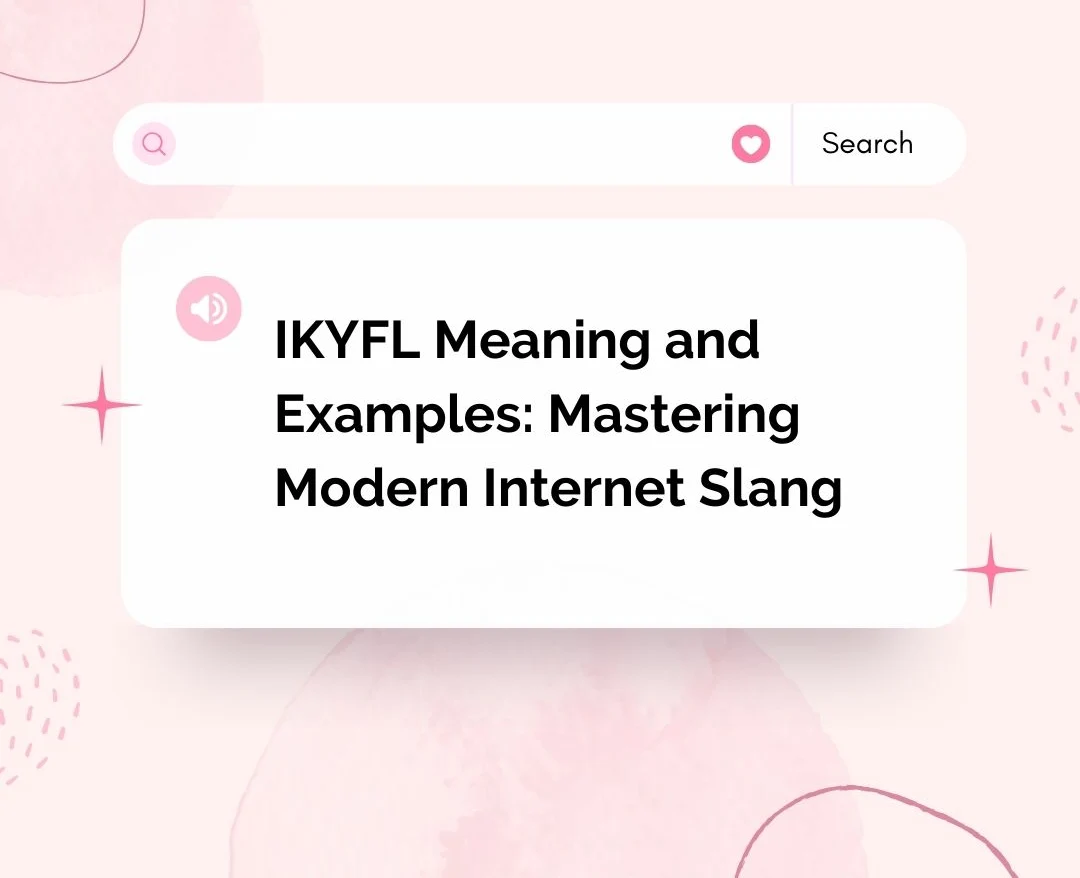IKYFL Meaning : If you’ve seen the acronym IKYFL (you know you expletiveing love it) floating around lately, you might be wondering what the hell it actually means and why everybody’s talking about it.
You’re not alone the trendy phrase has quickly become a fan favorite, particularly on the internet, and knowing what it actually means will keep you in the loop with today’s hottest digital lingo.
In this post, we’ll explore IKYFL meaning, review the origin of the phrase, and discuss when to use it in 2025.
By the time you finish, you will know exactly what this acronym is and why you should care to learn it. So, shall we get started and learn the real story of IKYFL?
What Is IKYFL?
At its heart, IKYFL is an acronym for “I Know You Fing Lying”*. This net word is often employed when a person is caught lying or suspected of being a liar. The phrase slightly means disbelief and humour with regard to the context it is used in conversation.

Funny, confrontational, IKYFL has become a go-to expression for expressing skepticism or calling someone out on their bullshit.
Including “Fing”* drives the point home, suggesting that the person is not just lying, but doing so in an extraordinarily blatant or bold-faced manner. *Note: the term “Fing” is understood to be an expletive.
For example, imagine a friend regaling you with an improbable tale, and you respond “IKYFL” in a playful but doubting way. Here it does, means that with a little humor (and in repetition to lessen the disappointment or hint at some doubt).
Origins of IKYFL
IKYFL owes its origins to the ephemeral universe of internet speak. Like many other trending phrases, IKYFL comes from the internet, memes and viral culture. It’s not so surprising that this acronym first bloomed on media platforms like Twitter, TikTok, and Instagram, where clever (or worse) pairings of letters have long flourished.
Early Usage:
The word began surfacing in memes and tweets, frequently in images or videos of individuals being ensnared in a lie. Along the way, it snowballed in casual online speech. It was a way for people not only to call out others, but also a way to jokingly ask in disbelief whether someone was telling the truth about something that was clearly false.
It’s worth noting here that IKYFL is not always used negatively. It’s a fun thing to it,often just a friend joke. So what might seem aggressive can sometimes, in context and tone of voice, whether flirty or just funny, be intended to ask serious or light.
Contextual Usage of IKYFL
To appreciate the full reach and versatility of IKYFL, you need to understand when and how it’s actually deployed in conversation.

When is IKYFL Used?
You can use IKYFL in a ton of different ways, and most of its use cases are those that involve someone lying or deceitful. Here are a few examples:
Exposed lie: Hear a clearly false story or claim from someone.
Example: “I glimpsed this enormous snake in my backyard, and it was no less than 10 feet long!”
Your response: “IKYFL! There’s no way.”
Playful teasing: Sometimes, IKYFL is used to mock someone who’s not being totally honest, even if what they’re saying isn’t harmful.
Example: “I aced that test!”
Your response: “IKYFL! I could see you were stuck on that last question.”
(Verse continued below) Read More Post The Bible and Stocks: Should Christians invest in the Stock Market?
Tone Matters
Like any phrase, the context in which it’s said can totally change the meaning of IKYFL. How the phrase is said can make it seem anything from joking to challenging.
Humorous Use: Said this in a teasing manner, it’s meant to both tease and disbelieve in a non-serious way.
Confrontational Use: In its more serious connotation it can be used to accuse someone of lying and possibly also of the need for an apology for it.
IKYFL in Popular Media
Viral Memes and the Power of Social Media
The internet has a knack for making popular sayings out of many things, and IKYFL is no different. The phrase quickly took hold because of meme culture, and it is ubiquitous on Twitter, TikTok and Instagram.
Impact On Social Media: IKYFL is employed mostly on social media platforms such as TikTok where influencers or content creators would use the acronym to reply to comments and DMs that exaggerate or say something ridiculous.
Meme Culture: Some memes using the phrase can be humorous, usually over-exaggerating peoples reaction to a lie, something funny is really relatable.
Examples in Memes:
There’s the classic meme format of a picture or GIF of someone rolling their eyes or laughing, with ”IKYFL” typed out on top. The visual humor combined with the phrase gives it a relatable edge.
How to Use IKYFL Correctly
IKYFL is a playful phrase but be sure to apply it appropriately, lest you be misinterpreted or offend. Here’s how to IKYFL properly:
Backstory: Best used when you’re not really sure about something that’s ringing a little true or when someone is obviously full of it.
Understand the tone: Again, it’s about the tone. For a lighthearted approach, make your tone playful, not accusatory.
Keep it in good company: Don’t use IKYFL in serious or formal scenarios, where it may sound rude or disrespectful.
Examples:
Playful: “Oh, you ran a 2-hour marathon? IKYFL!”

Serious: “You’ve never actually watched the movie Titanic? IKYFL. Everyone has seen it!”
By incorporating IKYFL in such scenarios, you can have a less serious, fun conversation and maintain a positive tone.
Variations of IKYFL
Of course as with any well-trodden phrase, derivatives and alternative terms develop. Here are some you’re likely to encounter in online discourse:
IKR (I Know Right): It’s an informal version of agreeing with something that someone has said. This isn’t about calling out something that’s not true; it’s about confirming what we all know to be true.
IKY (I Know You): Sometimes if the context is already understood, people will abbreviate the phrase as IKY.
IKYFLU (I Know You F\ing Lying, You)*: A complete version of IKYFL and used when you want to be extra emphatic.
Effects of IKYFL on the Internet Landscape
The emergence of IKYFL is part of a broader pattern in internet culture of humor and critique blended. In the age of memes, viral videos and internet slang, expressions such as IKYFL give strangers a way to connect by sharing common experiences and cultural touchstones.
Internet Slang Evolution:
IKYFL and other terms are part of a larger shift in language used online. Short punchy phrases capture the spirit of an idea in a few words and it is easier for people to engage. The use of these expressions indicates a degree of informality and sense of humor that has come to characterize interactions on the internet.
Rapid communication: As readers and audiences grow increasingly distracted, quick-fire acronyms such as IKYFL are used to shorten communication, but not the impact.
Collective experience: Clichés like these are connective tissue — communal laughs, inside jokes, shared memes.
IKYFL at a Glance : IKYFL Meaning
| Aspect | Details |
|---|---|
| Full Form | I know you f***ing lying |
| Usage | Expressing disbelief, skepticism, shock, or playful roasting |
| Origin | Black Twitter, mid-2010s |
| Popularity | Gen Z, Millennials; Twitter, TikTok, Instagram |
| Alternative Uses | Rarely: “I know you feel like” |
| Related Slang | LOL, STFU, GTFOH, IKYFLRN |
Should You Use IKYFL?
IKYFL may sound like a playful phrase to throw around, but there are a couple things worth understanding before you start using the acronym yourself.
When to Use IKYFL:
In friendly or family small talk.
In the comments of online forums or on social media where the mood is relaxed and/or playful.
When Not to Use IKYFL:
This is the one to use in professional from al contexts where formal language is appropriate; it is the only one in the earlier of these two categories.
When you are speaking to someone who may not know what internet slang is or may not like the term.
Conclusion
IKYFL has transcended from a casual internet slang to popularly used expression of disbelief or to call out lies. Whether you are sharing one over a friendly banter with friends, or laughing at a ridiculous one online, knowing the context and tone of IKYFL is of utmost importance. This phrase also signals the evolution of Internet culture into being more informal, fun, and direct in communication. So the next time someone tells you a story you think is too good (or too bad) to be true, don’t be afraid to say, “IKYFL” – but make sure it’s in the right company!
Now that you know what IKYFL means and manner in which it used, when will you use it in your next conversation? Let us know in the comments!








